12 Fat-Burning Foods To Accelerate Weight Loss
Losing belly fat isn’t about eating fewer calories. Achieving a healthy weight is about choosing the right foods that help your body burn fat while keeping you satiated and providing balanced nutrition.
Discover 12 fat-burning foods you should regularly include in your meal plan to lose body fat, curb hunger and sugar cravings, and reach your health and fitness goals.
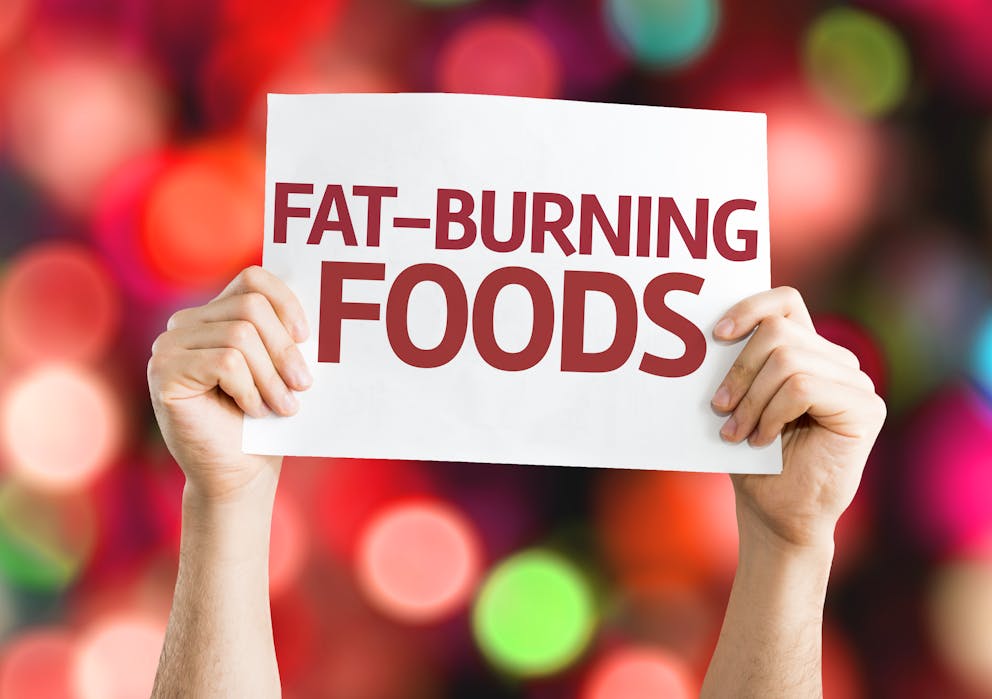
12 fat-burning foods
While no single food has magical fat-burning properties, regularly consuming certain foods is associated with a healthy body composition and a lower risk of health issues linked to excess body fat.
Here are 12 fat-burning foods that can help you lose weight fast.
1. Oily fish
Fatty fish such as tuna, salmon, trout, and mackerel are incredibly rich sources of healthy fats, including eicosapentaenoic acid (EPA) and docosahexaenoic acid (DHA).
A clinical trial published in the International Journal of Obesity reported that individuals who consumed five ounces (150 grams) of oily fish three times per week experienced more significant fat loss than those who consumed little to no omega-3-rich fish.
It’s believed that EPA and DHA promote fat loss due to their potent anti-inflammatory properties and benefits for metabolic health.
Inflammation can contribute to insulin resistance, which is a metabolic and hormonal imbalance that stimulates fat storage and blocks your metabolism from burning fat.
Omega-3 fish oils can lower inflammation, which explains why eating fatty fish has fat-burning benefits and can help shed belly fat.
2. Grass-fed beef
Grass-fed beef has a more balanced fatty acid profile than grain-fed meats and is a rich source of heart-healthy fats and conjugated linoleic acid (CLA).
Research published in Nutrients suggests that CLA promotes fat burning by stimulating the activity of lipoprotein lipase, an enzyme that facilitates the breakdown of stored body fat.
Grass-fed beef delivers high-quality protein and contains all nine essential amino acids, which help maintain muscle mass, promote hormone balance, and strengthen immune defenses.
While most people believe lean meat is the best choice for weight loss, fattier beef cuts are easier to digest and make you feel fuller for longer, which helps maximize the weight-loss benefits of eating grass-fed beef.
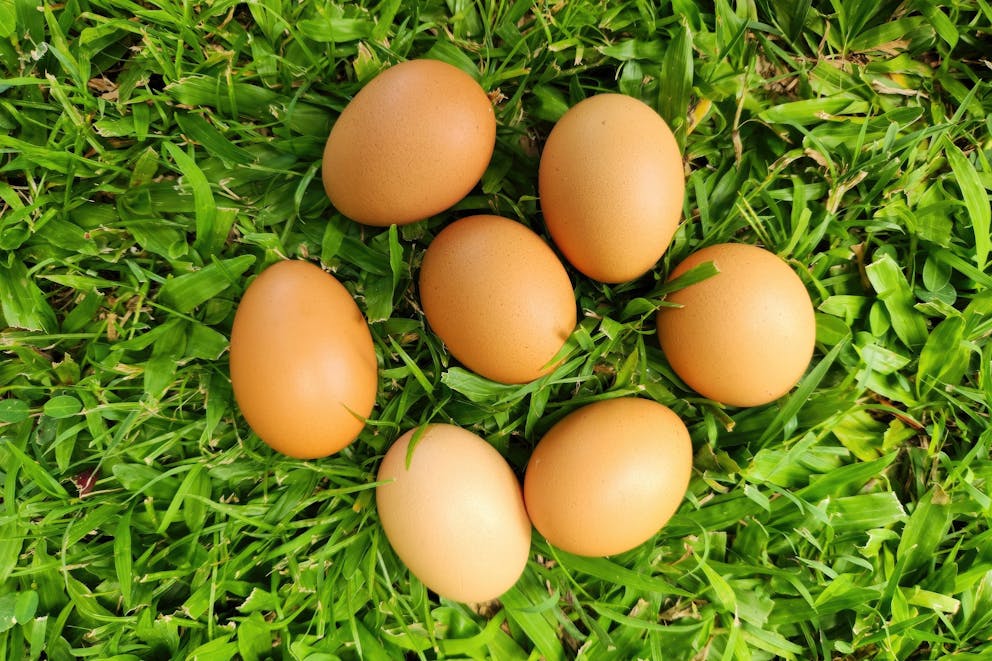
3. Pasture-raised eggs
Pasture-raised eggs provide significant amounts of vitamins and minerals, which are essential for overall health and can increase your basal metabolic rate (BMR), a measure of how many calories your body burns when at rest.
In addition, eggs can increase testosterone, a critical sex hormone that regulates body composition and fat cell distribution, and balanced testosterone levels are associated with a healthy metabolism and a lower risk of weight gain.
4. MCT oil
Medium-chain triglycerides (MCTs) are fatty acids found in coconut oil and grass-fed butter. They have long been recognized to increase fat burning and support long-term weight management.
A study published in Fats and Satiety suggests that MCTs are one of the most satiating fatty acids that can suppress appetite and curb cravings. This may explain why regularly consuming MCTs can accelerate weight loss.
5. Leafy green vegetables
Green leafy vegetables are a diverse group of nutrient-rich plants, including spinach, kale, Brussels sprout, Swiss chard, and collard greens.
Leafy greens are exceptionally nutrient-dense foods linked to a wide range of health benefits, including a lower risk of obesity, insulin resistance, metabolic syndrome, and type 2 diabetes.
These vegetables contain very few calories and are rich sources of dietary fiber, and eating between seven and ten cups of salad and leafy green vegetables daily can be an excellent way to lose weight and maintain a healthy body weight.
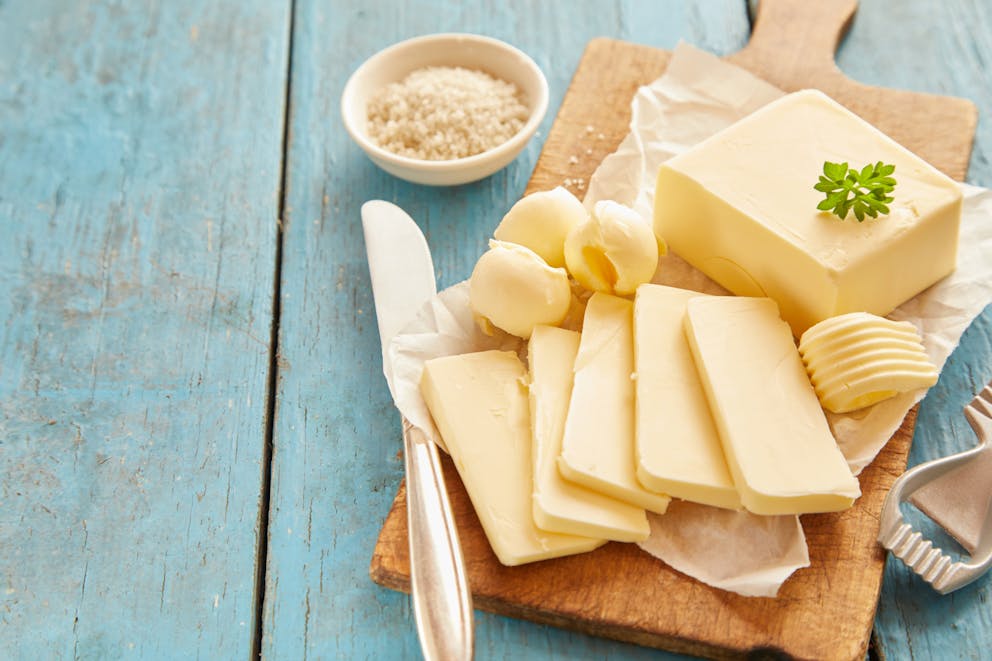
6. Grass-fed butter
Grass-fed butter is rich in healthy fats and boosts fat-burning, and regularly eating butter can help you lose weight.
Grass-fed butter contains fatty acids, including CLA and butyric acid. These fatty acids have been found to promote insulin sensitivity, which enhances the body’s ability to maintain blood sugar balance and plays a crucial role in metabolic health.
Impaired blood sugar control triggers fat storage and can increase inflammation, which creates a vicious cycle of insulin resistance, poor blood sugar control, and weight gain.
Research published in the European Journal of Nutrition confirms that regularly consuming high-fat dairy products such as butter is associated with better metabolic health and a lower risk of obesity.
7. Extra virgin olive oil
Extra virgin olive oil (EVOO) can help you maintain a healthy waistline and prevent weight gain.
EVOO is a rich source of oleic acid, a fatty acid with potent anti-inflammatory properties, and some evidence suggests that olive oil might be the next ibuprofen.
Oleic acid can reduce inflammation, which promotes cellular sensitivity to insulin, balanced blood sugar regulation, and metabolic health.
8. Chili peppers
Chili pepper and other spices such as cinnamon, turmeric, cardamom, and ginger have been linked to potential weight-loss benefits.
Chilli and cayenne peppers contain capsaicin, a phenolic compound that triggers the production of heat in the body. This increase in thermogenesis can temporarily boost your metabolic rate which means you burn more calories.
Aromatic spices such as cinnamon, turmeric, cardamom, and ginger are rich sources of various polyphenols that have been found to possess potent anti-inflammatory properties and promote insulin sensitivity and blood sugar balance.

9. Apple cider vinegar
Apple cider vinegar contains high concentrations of acetic acid, an organic acid that has been found to support healthy blood sugar levels and helps lower the risk of insulin resistance, a leading cause of weight gain and fatty liver disease.
“Acetic acid slows down gastric emptying, which buffers the rise of blood sugar levels after a meal,” explains Dr. Berg. “This avoids insulin spikes and enhances the liver's ability to burn fat.”
If you want to maximize its fat-burning effects, combine apple cider vinegar and cranberry juice to boost weight loss.
10. Full-fat dairy
While yogurts can be packed with sugar and should be avoided, unsweetened, full-fat dairy products such as grass-fed butter, greek yogurt, whole cream, and cheese can promote a healthy waistline.
A review study published in Advances in Nutrition investigated the metabolic effects of full-fat dairy and concluded, “Consumption of whole-fat dairy products is not associated with the development of obesity or cardiometabolic disease in adults, and could even be beneficial.”
High-fat dairy slows down the release of glucose into the bloodstream after a meal, which supports balanced blood sugar and insulin levels linked to a healthy weight.
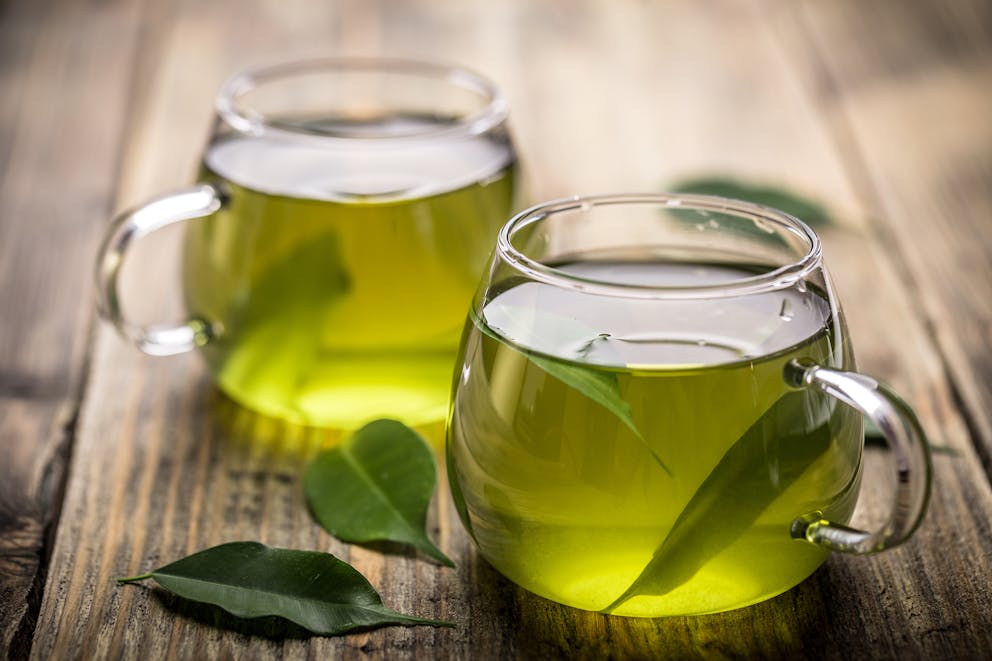
11. Green tea
Green tea has been extensively studied for its potential role in supporting weight management, and research suggests that individuals who regularly drink green tea are at lower risk of weight gain.
Green tea contains the catechin epigallocatechin gallate (EGCG), which has been found to enhance fat oxidation and stimulate the breakdown of stored body fat.
12. Coffee
Black coffee has many health benefits, and coffee drinkers may find it easier to maintain a healthy weight than people who don't drink coffee.
Research published in Physiological Research confirms the anti-obesity effects of coffee and suggests that coffee suppresses appetite and may enhance fat oxidation and that regular coffee consumption is associated with lower body fat.
Watch the video below to discover the best foods that make you lose the most weight.
Which foods are the worst for weight loss?
Are you on a never-ending weight loss journey despite closely watching your calorie intake?
Chances are you are eating the wrong types of foods that cause weight gain and block your body’s ability to tap into stored body fat.
Here are five of the worst foods for weight loss.
1. Carbohydrates and sugars
Eating carbohydrates and sugars is one of the fastest ways to get fat.
Refined carbohydrates, such as white bread, sugary cereals, and pastries, are quickly broken down into glucose and lead to rapid spikes in blood sugar levels.
The body responds to elevated blood sugar by releasing insulin to regulate blood glucose levels, which promotes the conversion of blood sugar to fat, blocks the liver from burning fat, and explains why carbohydrates and sugars lead to weight gain.
Many people believe that switching to whole-grain bread, brown rice, and whole-wheat pasta will support weight loss. However, this often is one of the biggest weight loss mistakes.
While these foods are more nutritious than refined grain products, they’re high in carbohydrates and a common reason for difficulties losing weight.
2. Processed foods
Evidence published in Cell Metabolism confirms that processed foods are a primary driver of weight gain and a significant cause of obesity, insulin resistance, and diabetes.
Processed foods are typically high in calories, refined carbohydrates, and harmful trans fats, which are associated with poor metabolic health, blood sugar imbalances, and excess weight.
In addition, foods such as cereals, chips, sugary drinks, processed meats, and fast foods often contain artificial flavorings, preservatives, and other synthetic ingredients that can trigger inflammation and hormonal imbalances linked to persistent weight gain.
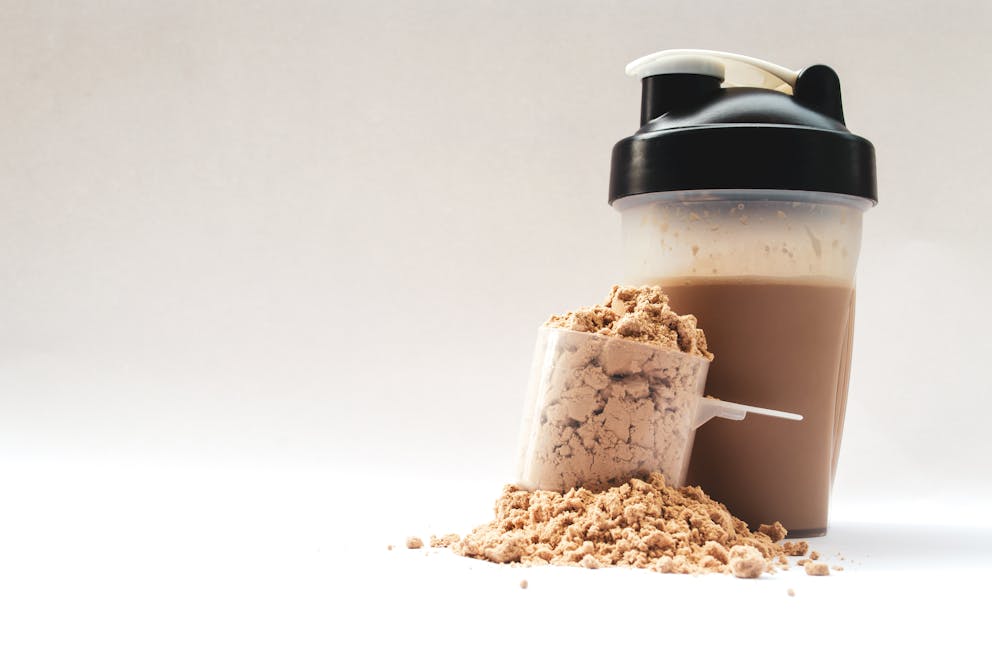
3. Protein shakes
While protein is crucial in maintaining muscle mass and hormone balance, too much protein can make you fat.
Replacing meals with protein shakes to lose weight can quickly lead to excessive protein intake.
Excess protein is either excreted or converted into glucose through a process called gluconeogenesis, which causes blood sugar spikes and can lead to weight gain.
In addition, many protein powders are laden with sugar and preservatives and are contaminated with heavy metals that are linked to poor liver function and can increase the risk of being overweight.
4. Snacks
Most snack foods are heavily processed and high in sugar or carbs and constant snacking is a weight loss trap.
Snacking throughout the day can keep blood sugar and insulin levels elevated, which keeps your metabolism in a fat-storage mode that prevents fat-burning and weight loss no matter how few calories you consume or how much you exercise.
5. Alcohol
Alcohol is a toxic compound, and the liver prioritizes the detoxification of alcohol over other metabolic processes, including fat burning.
Even small amounts of alcohol can stop weight loss, and regularly consuming alcohol can cause fatty liver disease, which is associated with poor metabolic health and weight gain.

Key takeaways
The best fat-burning foods contain little to no carbohydrates and are rich sources of healthy fats or anti-inflammatory nutrients that promote insulin sensitivity and blood sugar balance.
Regularly consuming oily fish, grass-fed beef, pasture-raised eggs, leafy green vegetables, extra virgin olive and MCT oil, aromatic spices, and high-fat dairy foods such as grass-fed butter can maximize weight loss and help achieve your health and wellness goals.
FAQ
1. Can certain foods speed up weight loss?
Yes, several foods can speed up weight loss.
While high-fiber foods promote satiety, other foods are rich sources of fatty acids that enhance your body’s ability to burn fat. In addition, certain plant foods and spices contain polyphenols, a group of bioactive compounds that promote metabolic health linked to a healthy weight.
2. What are the best fat-burning foods?
Some of the best fat-burning foods include grass-fed beef, pasture-raised eggs, oily fish, aromatic spices, green leafy vegetables, extra virgin olive oil (EVOO), medium-chain triglyceride (MCT) oil, and high-fat dairy such as grass-fed butter.
3. What should I eat daily to lose fat?
To lose fat and achieve a healthy weight, it’s essential to focus on healthy fats, including EVOO, coconut oil, and oily fish, and consume plenty of green leafy vegetables.
Opt for grass-fed beef, pasture-raised eggs, high-fat dairy products such as grass-fed butter, heavy cream, and cheese, and incorporate black coffee or green tea into your daily routine.
4. What foods should I avoid if I want to lose weight?
Processed foods, sugars, and refined grains such as white flour, rice, and pasta raise blood sugar levels and spike insulin, which promotes fat storage and blocks your liver from converting stored body fat into energy.
In addition, it’s essential to avoid alcohol and starchy vegetables such as potatoes, sweet corn, and yams, which are high on the glycemic index and are associated with weight gain.
5. Are vegetables good for weight loss?
Yes, vegetables are great for weight loss as they’re low in calories and rich in fiber, which promotes satiety and buffers the release of glucose into the blood.
However, it’s important to focus on leafy green and cruciferous vegetables and avoid starchy options such as potatoes, sweet potatoes, and sweet corn.
6. Are protein shakes good for weight loss?
While high-quality protein powders can be a good source of amino acids, protein shakes often contain high amounts of sugar and won’t help with weight loss.
In addition, using protein shakes as meal replacement can lead to an excessive intake of protein, which has been found to raise blood sugar levels and block fat-burning.
Sources
Previous blog
How to Fix a Stomach Ulcer—5 Natural RemediesTags

Popular
08/21/2024
51.4K views
02/23/2025
44.1K views
11/18/2024
261.1K views
03/18/2024
11/21/2022




